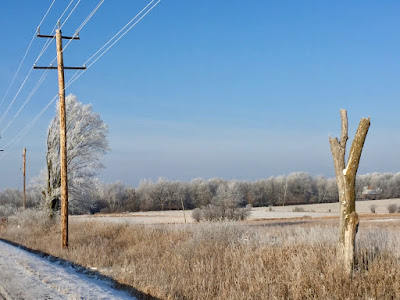How much snow will we get tomorrow? Will the storm track stay mostly south and east of the Twin Cities? That’s our hope, but we suspect the Daughter Person may be hoping to the contrary, since she’s a devotee of snow on the ground at Christmas. We’d be happy with a few inches on Christmas Eve that was gone by New Year’s day, but that’s not likely in our North Country. We may well be looking at snow covered ground for the next three to four months.
We are now well into soup and stew and chowder season. The Better Half is concocting some sort of soup for tonight’s dinner. It should be a nice accompaniment to the bread I baked yesterday. In much of nature, winter is a time when the pace of life slows. We humans seem to display no such sense. More’s the pity.
 |
| late autumn and early winter
Photo by J. Harrington
|
In less than two weeks, in the northern hemisphere we’ll be celebrating winter solstice. Shortly thereafter, days will begin to grow longer. I don’t feel as though I’ve even begun to adjust to the shortened days of autumn. If we really want to become more aware of and sensitive to nature, shouldn’t we adjust our daily, weekly, monthly and seasonal schedules in such a way that we reflect natural changes. Seeds, bulbs, leaves and other growing entities don’t function on a 40 hour week with time and a half for overtime. Nine to five isn’t a natural schedule, is it?
According to the USA National Phenology Network,
Phenology is a key component of life on earth. Many birds time their nesting so that eggs hatch when insects are available to feed nestlings. Likewise, insect emergence is often synchronized with leaf out in host plants. For people, earlier flowering means earlier allergies. Farmers and gardeners need to know the schedule of plant and insect development to decide when to apply fertilizers and pesticides and when to plant to avoid frosts. Phenology influences the abundance and distribution of organisms, ecosystem services, food webs, and global cycles of water and carbon. In turn, phenology may be altered by changes in temperature and precipitation.
If we actually want to minimize the disruptions triggered by climate breakdown to life as we know it, we probably would be wise to live with more awareness of seasonal changes. Does this suggest doing away with the arbitrary daylight savings time changes twice a year?
The Cold
By Wendell Berry
How exactly good it is
to know myself
in the solitude of winter,my body containing its own
warmth, divided from all
by the cold; and to goseparate and sure
among the trees cleanly
divided, thinking of youperfect too in your solitude,
your life withdrawn into
your own keepingto be clear, poised
in perfect self-suspension
toward you, as though frozen.And having known fully the
goodness of that, it will be
good also to melt.
********************************************
Thanks for visiting. Come again when you can.
Please be kind to each other while you can.
No comments:
Post a Comment